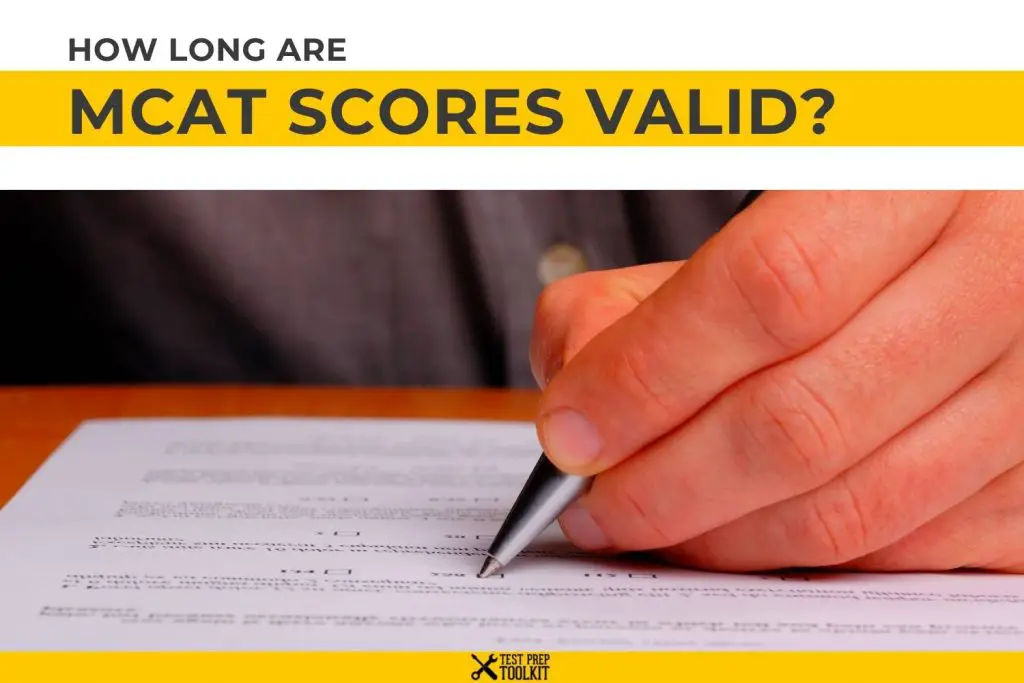See also our post on the Best MCAT Prep Courses so you can choose the right one for you.
Of course, most medical school applicants hope to continue their academic careers as soon as possible after taking the test, so the threat of MCAT scores expiring may not occur to them. But for prospective students who have had to delay their medical school applications due to extenuating circumstances, MCAT score “expiration dates” are crucial pieces of information.
This begs the question: How long are MCAT scores valid? Read on below to find the answer! We’ll discuss MCAT score validity periods, how medical schools perceive older scores, and what reasons for delaying medical school entrance might need consideration.
How Long Do MCAT Scores Last?

MCAT exam scores on their own are not inherently temporary. No expiration date comes with your MCAT scores that limit the length of time for which they are valid. Instead, the time constraint is on applicants according to each medical school, not the MCAT institution itself.
Each medical school has its guidelines and admissions criteria, and they can enforce these on applicants how they see fit. This means that each prospective medical school gets to decide on its own how recent a prospective student’s MCAT scores need to be to qualify for admission.
Luckily, most medical schools tend to be on the same page when deciding how long the MCAT score acceptance period should be. The majority of medical schools will accept MCAT scores from the previous three years before the date of application. More competitive or elite medical schools will probably limit this period to two years.
To ensure that your prospective school will accept your scores, you’ll need to be familiar with that school’s policies regarding MCAT scores and adhere to those guidelines. If the school to which you are applying will not accept your scores because they are more than two or three years old, you will need to retake the MCAT exam to receive a more current score.
You can also check out our article on How Many Times Can You Take The MCAT here.
Do Medical Schools View Old Scores and New Scores Differently?
A common question that medical school applicants have is whether a prospective medical school will look unfavorably upon MCAT scores that are older but still within the acceptable range. Luckily, this has not proven itself to be the case. As long as your scores are recent enough to fall within the appropriate period as decided by the school, they should be perfectly acceptable.
However, there has been a recent trend of medical schools that used to allow three years for MCAT score submission revising their standards to restrict this period to only two years. Therefore, you must keep up to date with your prospective school’s policies, especially if your scores are more than two years old.
To err on the safe side, students should apply for medical school programs while their MCAT scores are still less than two years old. This promptness provides a form of insurance in case the university changes its guidelines during your application process. Scores that are more than two years old may indicate to schools that your knowledge is out of date and could stand updating.
The other reason that some students may have older and newer scores is if they’ve retaken the MCAT to get a higher score. In this case, the schools will look at the score more so than the date you took it, so long as the oldest date is not more than two or three years old.
Should I Put Off Going to Medical School?

Of course, rather than rush into a challenging academic career to avoid retaking the MCAT, there are plenty of valid reasons to delay your application to a medical school. You can do a lot after finishing your undergraduate degree that will help your medical school application appear stronger.
If you can find a work opportunity in the medical field, having some on-the-job experience will undoubtedly make you a stronger applicant than someone who has never worked in medicine or health services. You might even decide you want to pursue a master’s degree first before continuing your academic career in medical school.
Or, maybe you want the opportunity to take the MCAT exam as many times as you need to earn a score that you feel confident about when applying for medical school. Whatever your reasons, there’s no rush. The most important thing is that you feel ready.
If you’re still a bit hesitant on taking the MCAT, see our post on When Should You Take The MCAT here.
Conclusion
There you have it! Everything you need to know about MCAT score validity. Make sure to keep up to date on your prospective medical school’s application and exam score requirements, and you should be all set to get started on your path to your medical career. Good luck!

